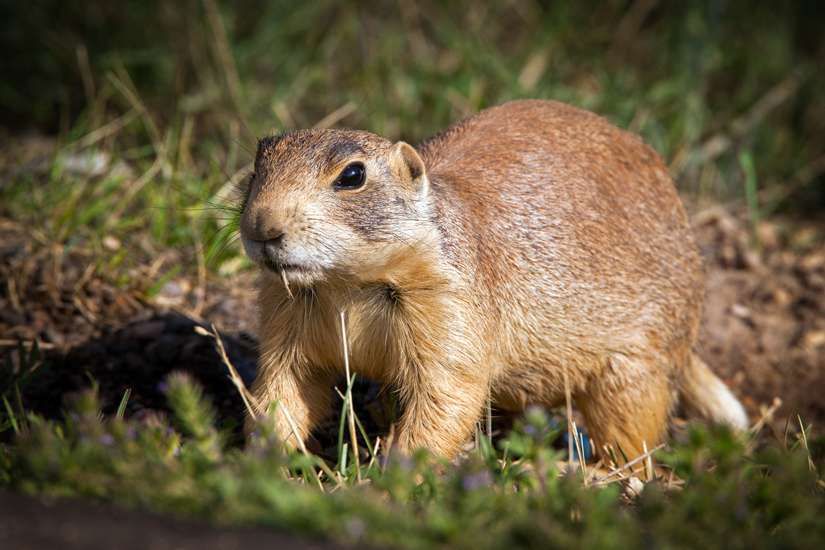Does the Commerce Clause Empower Congress to Regulate Every Living Thing?
A potential Supreme Court case challenges federal protection of an intrastate species with no commercial value.

According to a Supreme Court brief filed today, Utah prairie dogs "produce nothing of importance except the annoyance of the surrounding population," and "they make terrible pets." The brief, which urges the Court to hear a constitutional challenge to a federal regulation protecting the rodents, concedes that they are "adorable little critters" but notes that "the protection of cuteness is not a congressional power" granted by the Constitution.
The brief, filed by the Cato Institute, the Reason Foundation (which publishes this blog), and the Individual Rights Foundation, asks the Supreme Court to overturn a March 2017 ruling upholding the U.S. Fish and Wildlife Service's decision to list Utah prairie dogs as a "threatened" species. That designation makes it a federal crime to "harass, harm, pursue, hunt, shoot, wound, kill, trap, capture, or collect" animals on the list. In rejecting a challenge to the listing by People for the Ethical Treatment of Property Owners, the U.S. Court of Appeals for the 10th Circuit relied on an alarmingly broad understanding of the congressional power to regulate interstate commerce.
"The government seeks to protect an abundant, commercially irrelevant, and wholly intrastate rodent without regard for whether such regulation has any connection to economic activity, let alone commerce among the several states," says the Cato/Reason/IRF brief. "The Utah prairie dog is not a marketable commodity. There is no illicit trade in prairie dog horns or hides for the government to suppress. They carry no firearms into school zones. Their domestic relations are none of the government's business. Finally, they have neither purchased health insurance nor plan to do so in future." Those are references to Supreme Court cases in which the government claimed (mostly without success) that a federal law was constitutional because the activity it regulated had a "substantial effect" on interstate commerce.
Although Utah prairie dogs have no commercial value and live only in the southwestern part of that state, the 10th Circuit reasoned that the power to protect them is a crucial part of a broader regulatory scheme. A similar argument was the basis for Gonzales v. Raich, the 2005 case in which the Supreme Court upheld the federal power to criminalize production and possession of homegrown medical marijuana. But unlike marijuana, Cato et al. note, Utah prairie dogs are not a fungible commodity, and their status has nothing to do with that of other animals protected by the Endangered Species Act. Contrary to what the appeals court implies, the brief says, it is obviously not true that "removal of the prairie dog from federal jurisdiction will render the government impotent to bar trafficking in eagle feathers."
If any species are subject to congressional regulation, the appeals court implies, all of them are. "The Tenth Circuit's reasoning would apply to all animals, meaning that a general jurisdiction over all wildlife is hidden in the Commerce Clause," the brief says. "Congress, it is said, does not 'hide elephants in mouseholes,' but apparently the Constitution hides all animals in the nation in a prairie dog hole? Moreover, because the ESA isn't limited to animals but includes plants too, Congress apparently has the power to oversee all living organisms because some living organisms may have a substantial effect on interstate commerce."
The 10th Circuit also suggested that Congress can justify its own power grabs by citing their economic impact. "The Constitution does not work on rewind," Cato et al. say. "Congress may not create an economic effect in order to regulate it, for the same reason it may not invade a country to declare war….If the effects of Congress's own laws can create the jurisdictional hook for Commerce Clause regulation, then Congress is the progenitor of its own power."
Utah prairie dogs, by the way, are doing just fine. The Fish and Wildlife Service considers them threatened only because the animals live mostly on private property. "While 70 percent of the population resides on private land, the government counts only the federal-land population on the theory that bloodthirsty Utahns would butcher privately domiciled prairie dogs if the species were delisted," Cato et al. say. "Thus this non-endangered 'threatened' species is listed on a theory that, if taken to its logical conclusion, would place all organic life in the United States into congressional jurisdiction because some conjectural private party might impose some vaguely defined harm at some hypothetical date in the future."


Show Comments (69)